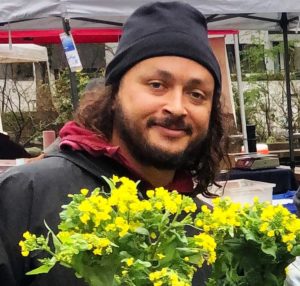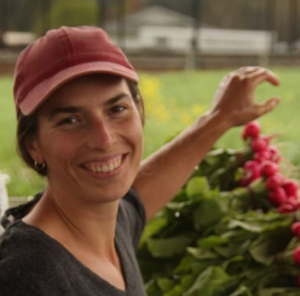One of the best things about working at Portland Farmers Market is the opportunity to meet and really get to know the farmers we work with at our markets. We’re able to form relationships that last years, through the good seasons and the not-so-good, and hear fantastic stories about life on the farm. One of our core missions is to help bring as much of that experience as possible to our customers too, to help bridge the gap between the people who grow food and those who buy and eat it.
Meet Mike and Noémie

Mike Simington owns and operates Simington Gardens, a certified organic farm in Aurora, OR.
He comes from a family of Oregon farmers and educators, some of whom traveled west on the Oregon Trail to homestead in the Willamette Valley and others who came later, traveling from their Arkansas farms to the newly formed Vanport community working in the Kaiser Shipyards during WWII. You can find Simington Gardens at PSU Farmers Market on Saturdays year-round.

Noémie Messier-Guimont owns and operates Farm D’Ici, a certified organic vegetable farm in Canby.
Since immigrating from Canada, Noémie has brought her expertise in composting and soil to growing food sustainably and at a human scale here in the Willamette Valley. You can find her amazing vegetables at our Shemanski Park Farmers Market on Wednesdays.
What is the biggest change on your farm since the COVID outbreak?
Submitted by Michelle in SE Portland
Mike:
Wow, there have been so many big changes it’s hard to pick just one. If I had to choose, I would have to pick something that has changed the work flow and also the culture of the farm. To some extent that would be the need to social distance. So much of our work here is repetitive and at times tedious. In the past, we have attacked these tasks as a group working side by side, directly across from one another, or otherwise in very close proximity talking, singing and just being there getting it done together. Since Covid 19, to meet and exceed safety guidelines, we have had to divide and complete our tasks with folks working completely independently or spread way out to adhere to the social distancing guidelines. This has carried over to the market, as well, with things that have historically made the market standout from other ways to shop reduced. For example, being able to meet and talk to the customer and the costumers ability to touch, smell and select the produce that they like the best. In a nutshell, the restriction of human contact and communication is the biggest change we see across the board.
Noémie:
I would say the biggest change is a positive change. I am experiencing a desire from our community to have access to fresh local organic produce. I have had to change to way I sell my produce and include a CSA model as market attendance is lower for me than usual. I was able to fill up my CSA offering and it warmed my heart. I have never done a CSA on my own before, so there was a learning curve. I had to change somewhat my crop plan and learn how to do some marketing, how to use spreadsheet and have more dedicated communication with members via emails. I do believe the pandemic brought a greater understanding on how essential a thriving small-scale regional agriculture is.
If you had to pick one favorite crop, what would it be, when is it available at the market, and what’s your favorite way to prepare and eat it?
Submitted by @filbertistohazelnut on Instagram
Noémie:
Oh no! Not the favorite crop question! I love everything I grow. What I don’t love, I don’t grow! What I am most excited at this moment is the cucumbers. The small tender ones, fresh off the vine is how I like to eat them.
Mike:
It would have to be our salad mix. It has been a consistent product that can be planted year round offering the potential for financial stability. It also allows a buffer for mistakes because we can grow it year round and seed it multiple times a year. On top of all the more technical reasons, it tastes great and changes throughout the season. It is available at our booth year throughout the year. Our favorite way to eat it is to put it in a bowl and load it up with other fresh veggies, hit it with a dressing and enjoy.
We hope to continue this series in the coming months and years, so if you have any questions for our farmers and ranchers, please leave them in a comment on this article or anywhere we post it on social media. Thanks to everyone who submitted questions this time. We never throw any away, so if yours didn’t make this article, it very well might down the road!
